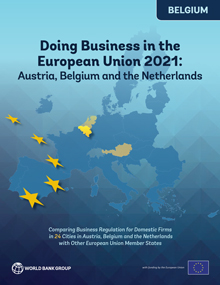Overview
Doing Business in the European Union 2021: Austria, Belgium and the Netherlands assesses the regulatory environment for businesses and its impact on local entrepreneurs in 7 cities in Austria (Bregenz, Graz, Innsbruck, Klagenfurt, Linz, Salzburg and Vienna), 7 cities in Belgium (Antwerp, Bruges, Brussels, Charleroi, Ghent, Liège and Namur) and 10 cities in the Netherlands (Amsterdam, Arnhem, Eindhoven, Enschede, Groningen, The Hague, Maastricht, Middelburg, Rotterdam and Utrecht). The study measures regulations relevant to five stages in the life of a small to medium-size domestic firm: starting a business, dealing with construction permits, getting electricity, registering property, and enforcing contracts. In each of these areas, the study highlights good practices that can be leveraged to empower local entrepreneurs and firms.
Doing Business in the European Union is a series of subnational studies requested and funded by the European Commission, Directorate-General for Regional and Urban Policy, and produced by the World Bank Group. Previous editions, covering cities from Bulgaria, Croatia, the Czech Republic, Greece, Hungary, Ireland, Italy, Portugal, Romania, and Slovakia, were released in 2017-2019.
Where is it easier to do business in Belgium?
Main Findings
- Strong performance in one area coexists with weak performance in another. Except for Antwerp (which scores among the top three cities for all areas benchmarked) and Liège (which ranks in the bottom half in four areas), all other cities rank in the top half in at least one area and the bottom half in another. The different strengths of these cities mean they have something to learn from each other.
- The largest subnational variations in the ease of doing business score are in enforcing contracts and registering property. Resolving a commercial dispute is easiest in Namur, where it takes only 10 months—faster than in any EU capital—and costs less than the EU average. A combination of relatively high costs and the longer time required to resolve a commercial dispute (almost 17 months) places Brussels below the EU average. These variations in regulatory performance can help policy makers identify and adopt in-country good practice examples to improve regulatory performance in their jurisdictions and take the steps needed to close the gap.
- Starting a business is the only area in which the Belgian cities perform homogeneously. There is a high level of centralization—with one-stop shops monitored at the federal level—and national digital infrastructure to carry out most processes in this area. Moreover, small and medium enterprises (SMEs) that do not pose environmental risks or are not subject to special licensing are exempted from most local permit authorizations.
- Time is the main source of variation among the performances of the Belgian cities benchmarked. Firms in Brussels spend more productive hours complying with regulatory requirements in the five areas benchmarked than elsewhere in the country: entrepreneurs in the Belgian capital spend nine months more on compliance than their peers in Namur. Wide variations in time reflect the efficiency of local, regional, and federal agencies. Even where legislative requirements are similar—for example, property transfer and contract enforcement—service provision standards can diverge, with either positive or negative consequences for entrepreneurs.
- Local good practices, which can be easily replicated, exist in all three regions, especially in dealing with construction permits and enforcing contracts. In starting a business, getting electricity, and registering property, Belgium can also look elsewhere in the European Union and globally to boost its competitiveness.
Note: The Doing Business 2021 data for Brussels, as well as for comparator economies and regional averages, are not considered official until published by the Doing Business 2021 report.

